Gary Steel has patiently waited for more than 40 years for King Crimson to make it down to New Zealand. Finally, his day his come. Sort of. He talks to the group’s singer-guitarist, Adrian Belew.
 PROGRESSIVE ROCK WAS, as those dusty historic tomes tell us, big in the ‘70s. Not just big, as it happens, but enormous.
PROGRESSIVE ROCK WAS, as those dusty historic tomes tell us, big in the ‘70s. Not just big, as it happens, but enormous.
What was more commonly referred to in the very early ‘70s as “underground rock” quickly shed that moniker, as the post-psychedelic bands that made up its numbers transitioned from playing in damp English pubs to American stadiums.
The band that most often is credited with getting the progressive rock ball rolling in 1969 is King Crimson, whose epochal debut, In The Court Of The Crimson King, contained everything that would come to be associated with the term “progressive”: dystopian imagery, trippy artwork on gatefold sleeve, a canny mixture of pretty acoustic and blazingly rifftastic electric rock, virtuosic performances from the whole ensemble, unfeasible and constantly changing time signatures… oh, and it took the lion’s share of its cues from the European classical tradition, rather than the typical white rock band “let’s steal our licks from the old blues guys” approach.
Later, Yes would soften things up by adding a more rounded symphonic approach to “prog”, along with Jon Anderson’s Tolkienesque lyrics, and a swag of newer bands took the genre into a more fantasy-oriented direction, leading some to view it retrospectively as “dungeons & dragons” music.
King Crimson and the sadly much-maligned Emerson, Lake & Palmer, and more experimental groups like Egg and Henry Cow, were really of a different ilk to Yes and later symphonic prog bands like Marillion. But only ELP, with their outrageous and over-the-top show spectacles, would win mainstream success. King Crimson suffered many lineup changes in the early ‘70s (including losing original vocalist Greg Lake to ELP) and lost much of its audience along the way. But what they did do was laudable: each version of the group continued to invest into an idea of modern music that involved intense discipline, both compositional elements and “instant compositions” (read: improvisation), and a rather brazen determination to make something that, while it used “rock” technology and instrumentation, wasn’t really rock as we knew it.
Crimson, aside from being leading edge, were also searingly volatile riff-monsters, and (for better or worse) paved the way towards the kind of highly disciplined metal we see in 21st century bands like Tool and Meshuggah, and their mid-‘70s album, Red, was apparently one of the biggest influences on a young Kurt Cobain.
It’s the 1980s and 1990s versions of King Crimson that are perhaps best known. After a five-year sabbatical, guitarist/guru Robert Fripp reformed the group with an almost-new lineup dominated by the singing, lyrics and songs of an American guitarist, Adrian Belew, who had been discovered by Frank Zappa, cherry-picked by David Bowie, and gone on to lend his distinctive fretboard skills to the likes of Talking Heads and Ryuichi Sakamoto, amongst others.
The group would continue with permutating lineups, all of them featuring Belew bellowing his lungs out and making strange elephant noises on his guitar.
 ADRIAN BELEW HAS been to New Zealand once, but never with King Crimson, and after his visit to Auckland on January 7, King Crimson will still not have played here… well, not quite.
ADRIAN BELEW HAS been to New Zealand once, but never with King Crimson, and after his visit to Auckland on January 7, King Crimson will still not have played here… well, not quite.
When Belew last performed in Auckland, it was as a member of David Bowie’s band, at Western Springs, in February of 1978. I was in that audience. It rocked.
“I’ve not been down since and I’m dying to come back,” says Belew, who really does sound enthusiastic about the prospect. “I really can’t wait. It’s going to be exciting to come back. It’s probably very different, that was a long time ago, but I remember it fondly.”
What he’ll be doing down here is playing his part in something called The Crimson ProjeKCt. As the press release states: “The Crimson ProjeKCt is a King Crimson offshoot featuring three current members of that historic band. Adrian Belew and Tony Levin joined King Crimson in 1981, giving birth to the fourth incarnation of the band (alongside Robert Fripp and Bill Bruford). Pat Mastelotto joined in 1994, initiating the double-trio phase. They last played together as King Crimson in 2008.”
So, is it a kind of high quality Crimson tribute band, or some kind of nostalgia show? More oldies trotting out the hits? [Or in their case, the non-hits?]
“Well, it’s not a nostalgia thing in the sense that all of the musicians are still creating new things, as opposed to some bands who are just going out and playing the one thing that they’ve done in their lives,” says Belew.
“We all continue to find all kinds of new things. It’s actually the closest thing you can have at this point to King Crimson. I’m sorry that we didn’t come with the real thing all those years ago. I wanted to. But at the same time it’s not King Crimson, it’s an interpretation of our own music, so in that way to me it’s fresh.
“The whole reason for it, and the whole idea came from the fact that we wanted to celebrate the music that we were a part of. Tony Levin and I have been in the band for 32 years now, and in 2011 when we realised it was our 30th year anniversary of being in King Crimson, we decided ‘let’s play some King Crimson and celebrate that’.
“I guess there’s a nostalgic factor in the sense that there’s not new music but the show is more than just Crimson. There is new music in that my Power Trio plays a set by itself, and Tony and Pat’s band, Stickmen, plays a set by itself, so you’ll hear interesting music that you don’t necessarily hear, and then we come out together and for an hour and a half as a six-piece monstrous King Crimson band, which is pretty exciting. You don’t get to hear a band that size anymore.”
 So The Crimson ProjeKCt, just to make this clear, comprises three sets: one of original material by Belew’s present group, the Power Trio, another by Stickmen, a group featuring two other Crimson players, drummer Pat Mastelotto and bassist and Chapman stick manipulator, Tony Levin. And finally, a grand union of the two for a bunch of King Crimson songs. It should be a hoot, and a long one.
So The Crimson ProjeKCt, just to make this clear, comprises three sets: one of original material by Belew’s present group, the Power Trio, another by Stickmen, a group featuring two other Crimson players, drummer Pat Mastelotto and bassist and Chapman stick manipulator, Tony Levin. And finally, a grand union of the two for a bunch of King Crimson songs. It should be a hoot, and a long one.
“It’s about three hours long – it’s the longest show I’ve done since my days with Frank Zappa. Those shows were three hours too. But of course, I’m not there for the whole three hours.”
Zappa was known for rehearsing his bands for up to six months before going on the road. As the Auckland date will be the first of The Crimson ProjeKCt’s 2014 tour, I wondered whether there would be an intensive rehearsal period, or would the Auckland gig goers be guinea pigs?
“We won’t even have rehearsal time,” says Belew. “We will just come in and get adjusted and we should know what we’re doing. We know this material, we’re comfortable with it, and we’ve done quite a few dates now.
“I know for myself it’s always a bit edgy on the first show knowing that we didn’t actually sit down and make sure we remember everything, but it’s up to the players to do that, and I will for one, I will be totally ready to go. I’m sure everyone will. You’re talking about some highly professional players who are used to playing in all sorts of situations and with all sorts of people, so the Crimson music… the nice thing for me about it is that I’m so comfortable with it, it’s music that I’ve been part of for over 30 years now, so it’s like ‘flip on your shoes and start running.”
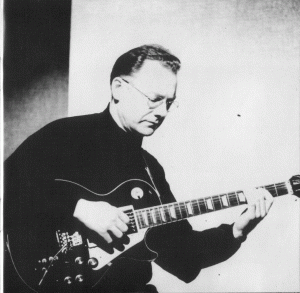
“I asked Robert several times if he wanted to join us,” says Belew. “But he doesn’t want to travel or tour anymore, so he sort of made fun of it. ‘I’m happy for you to do it, Ade’. He gave it his full support, even named it the Crimson ProjeKCt to show his support. We’re just trying to play the King Crimson music that we did, and we’ve got a guy in Stickmen, Markus Reuter, who plays touch guitar and is a student of Robert’s, and he plays Robert’s guitar parts very, very well. I’m not saying you won’t miss Robert, but you will have all the same musical components.”
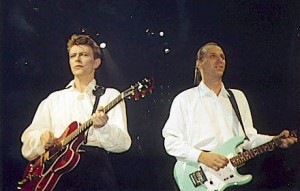
“There was a point in my life where touring became pretty miserable, and in fact it probably coincided with the time Bill was feeling that way,” says Belew. “But I got over that at some point and decided that I really do enjoy traveling and meeting so many new people and playing in all these great places. I love the audiences that we have. I don’t want to cut myself off from that. I’m still healthy, I’m still young enough, I feel good, I don’t feel at all my age. So until there’s a reason to stop, I don’t think I will.”
As opposed to Robert Fripp: “It’s just at a point where Robert doesn’t want to do much, and I do”, he laughs.
 BELEW’S SINGING, AND strong musical personality can be polarising. I still come across King Crimson fans that despise the lineups that feature Belew, and from time to time, I’ve struggled with it myself.
BELEW’S SINGING, AND strong musical personality can be polarising. I still come across King Crimson fans that despise the lineups that feature Belew, and from time to time, I’ve struggled with it myself.
For me, it’s not that I dislike Belew’s singing or songwriting or think his performative skills as not being up to scratch, it’s just that to me, King Crimson were always a very English band, and his presence Americanised the group, and gave it a very, very different sound.
On its earliest dates, the first version of the band to feature Belew was actually called Discipline, which ended up being the name of the album, while eventually the band was re-christened King Crimson. I still think that Discipline would have suited the group better. I still would have been a fan, but the group would have shed its weight, and lived with the name more easily.
Taken on his own terms, Belew is a phenomenally skilled and creative individual, and his talent and musical personality can be seen in different perspectives on his solo records, in King Crimson-related projects, and on his session work. As I chatted to Belew, I couldn’t help thinking of the two (very different) albums I’d listened to in the past few weeks that contained his distinctive guitar work: a 1980 Ryuichi Sakamoto album, Left Handed Dream, and the new Nine Inch Nails opus, Hesitation Marks.
And I couldn’t help wondering: which part of this thing means more to him, and if he had to give one of them up, which would it be? Those solo albums are often dashingly ambitious for quirky handcrafted home-studio works, and they’re often full of heartbreaking Beatles-influenced melodies and Belew’s uniquely ecologically oriented, pointedly politically skewed lyrics.
Then there’s Crimson, where to some extent he reigns it in for the greater good, but still gets to unleash some terrific guitar flurries and write some of the most personable and memorable lines ever uttered by a “prog” band.
Yet again, his session work can be seen as one of the most superb sets of guest appearances in all of rock, barring the overlord, Fripp himself!
Unsurprisingly, the session work comes third in his list of priorities.
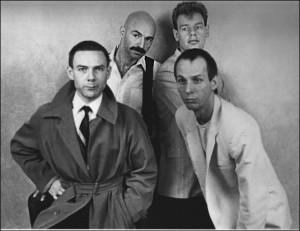
And if he had to give one thing up? “It wouldn’t be guitar! That’s sort of an extension of my personality and… man, I would loathe to give up anything. I would be loathe to give up songwriting. I feel like I’ve achieved quite a lot of what I want to achieve with songwriting, but I’m still finishing out the picture of what I want to do with the guitar. But at the same time, I don’t want to stop anything… I’m going in the opposite direction. I’m trying to do more things than ever. They’re all important to me, but guitar seems the most natural thing. But then again, I’ve been a singer since I was a little kid, so if I couldn’t sing, that would be terrible. I can sing, and I’m coming to sing for you guys!”
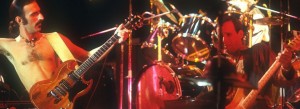
“That’s probably one of the biggest complements ever,” says Belew. “Well, I had done this record, called Desire Caught By The Tail, my third solo record, which was nothing like anything else I’ve ever done. It was orchestral pieces with guitar playing all the orchestral instruments. It was one of the best early uses of guitar synthesis technology, and I think that’s what impressed him.”
So now we know. GARY STEEL
• The Crimson ProjeKCt performs at The Studio, Karangahape Rd, Auckland, Tuesday June 24, 2014. http://www.ticketmaster.co.nz/










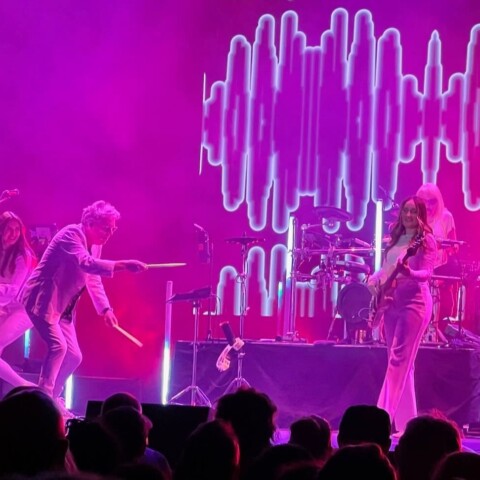
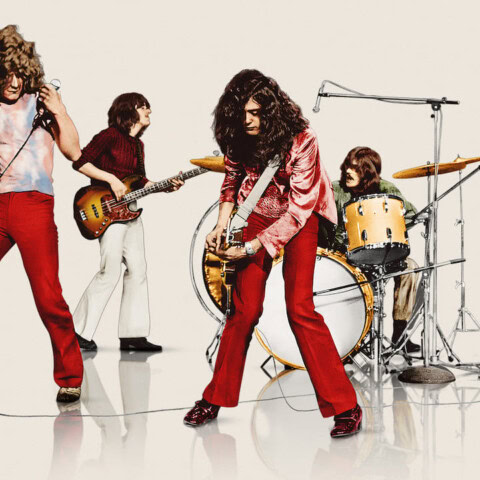

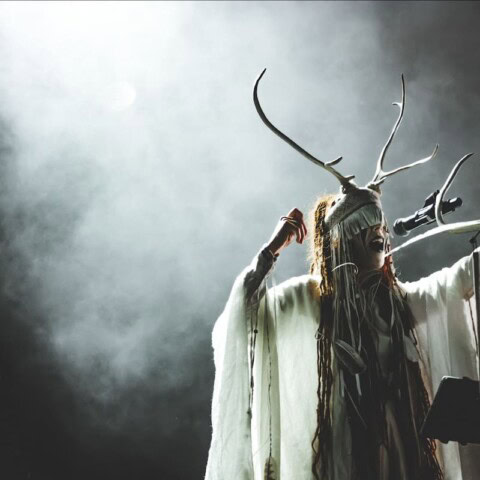
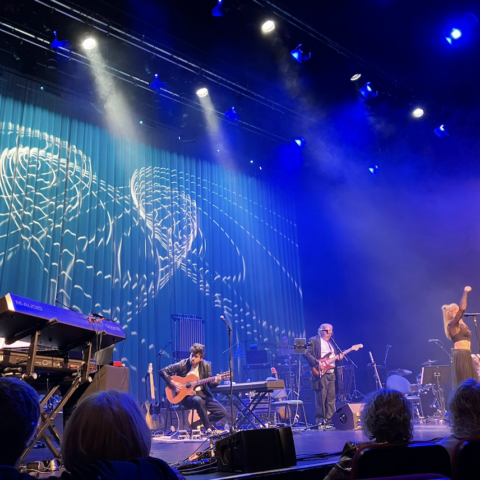

The key word for me that you used in this article is “discipline”, that being an 80s era album title, and for my dosh, far from Americanising Crimson, Belew helped Fripp’s guitar craft emphasis find a strong groove.
Where/how can I book a ticket?
Hey Stephen – tour dates were postponed now playing June 24th at the studio – https://www.facebook.com/events/680493705332350/
i feel bad for ade not being part of kc8, ashe has greatly contributed to what i call the reborn crimson, discipline to present. I think fripp wants to revisit the old crimson, which, in my opinion have 3 master pieces(lark’s tongues, starless, and red), and perhaps he could not find a ‘role’ for him! i truly hope kc8 will play paris france in the near future.i have had the honor of meeting all the members of kcpjkct, and pat mastelotto has become one of my favorite drummers…they were all very nice